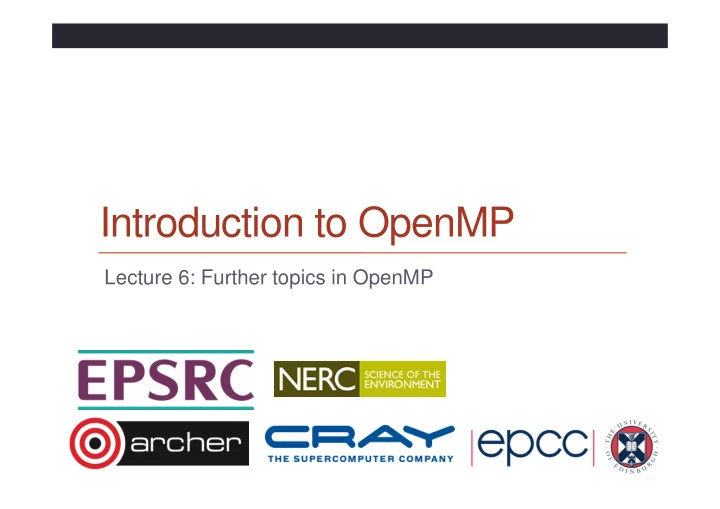

Introduction to OpenMP Lecture 6: Further topics in OpenMP
Nested parallelism • Unlike most previous directive systems, nested parallelism is permitted in OpenMP. • This is enabled with the OMP_NESTED environment variable or the OMP_SET_NESTED routine. • If a PARALLEL directive is encountered within another PARALLEL directive, a new team of threads will be created. • The new team will contain only one thread unless nested parallelism is enabled.
Nested parallelism (cont) Example: !$OMP PARALLEL !$OMP SECTIONS !$OMP SECTION !$OMP PARALLEL DO do i = 1,n x(i) = 1.0 end do !$OMP SECTION !$OMP PARALLEL DO do j = 1,n y(j) = 2.0 end do !$OMP END SECTIONS !$OMP END PARALLEL
Nested parallelism (cont) • Not often needed, but can be useful to exploit non- scalable parallelism (SECTIONS). • Note: nested parallelism isn’t supported in some implementations (the code will execute, but as if OMP_NESTED is set to FALSE). • turns out to be hard to do correctly without impacting performance significantly.
NUMTHREADS clause • One way to control the number of threads used at each level is with the NUM_THREADS clause: !$OMP PARALLEL DO NUM_THREADS(4) DO I = 1,4 !$OMP PARALLEL DO NUM_THREADS(TOTALTHREADS/4) DO J = 1,N A(I,J) = B(I,J) END DO END DO • The value set in the clause supersedes the value in the environment variable OMP_NUM_THREADS (or that set by omp_set_num_threads() )
Orphaned directives • Directives are active in the dynamic scope of a parallel region, not just its lexical scope . • Example: !$OMP PARALLEL call claire() !$OMP END PARALLEL subroutine claire() !$OMP DO do i = 1,n a(i) = a(i) + 23.5 end do return end
Orphaned directives (cont) • This is very useful, as it allows a modular programming style…. • But it can also be rather confusing if the call tree is complicated (what happens if claire is also called from outside a parallel region?) • There are some extra rules about data scope attributes….
Data scoping rules When we call a subroutine from inside a parallel region: • Variables in the argument list inherit their data scope attribute from the calling routine. • Global variables in C++ and COMMON blocks or module variables in Fortran are shared, unless declared THREADPRIVATE (see later). • static local variables in C/C++ and SAVE variables in Fortran are shared. • All other local variables are private. • Reduction needs some careful consideration • If reduction declared at the parallel level data only correct after the parallel region • Declare reduction on the orphaned loop level, make reduction variable(s) shared at the parallel level
Binding rules • There could be ambiguity about which parallel region directives refer to, so we need a rule…. • DO/FOR, SECTIONS, SINGLE, MASTER and BARRIER directives always bind to the nearest enclosing PARALLEL directive.
Thread private global variables • It can be convenient for each thread to have its own copy of variables with global scope (e.g. COMMON blocks and module data in Fortran, or file-scope and namespace-scope variables in C/C++) . • Outside parallel regions and in MASTER directives, accesses to these variables refer to the master thread’s copy.
Thread private globals (cont) Syntax: Fortran: !$OMP THREADPRIVATE ( list ) where list contains named common blocks (enclosed in slashes), module variables and SAVEd variables.. This directive must come after all the declarations for the common blocks or variables. C/C++: #pragma omp threadprivate ( list ) This directive must be at file or namespace scope, after all declarations of variables in list and before any references to variables in list . See standard document for other restrictions.
COPYIN clause • Allows the values of the master thread’s THREADPRIVATE data to be copied to all other threads at the start of a parallel region. Syntax: Fortran: COPYIN( list ) C/C++: copyin( list ) In Fortran the list can contain variables in THREADPRIVATE COMMON blocks.
COPYIN clause Example: common /junk/ nx common /stuff/ a,b,c !$OMP THREADPRIVATE (/JUNK/,/STUFF/) nx = 32 c = 17.9 . . . !$OMP PARALLEL PRIVATE(NX2,CSQ) COPYIN(/JUNK/,C) nx2 = nx * 2 csq = c*c . . .
if clause • Can add if clause to: • parallel • for/do • sections • if clause takes scalar expression (C/C++) or scalar logical expression (Fortran) • if(i) • if(i<100) • logical :: mylogical …. if(mylogical)
if clause !$OMP PARALLEL shared(b,n) private(i)if(n>100) !$OMP DO do i=1,n b(i) = b(i) * 2 end do if(omp_in_parallel()) then write(*,*) ‘done the work in parallel’ else write(*,*) ‘done the work in serial’ end if !$OMP END PARALLEL
Timing routines OpenMP supports a portable timer: • return current wall clock time (relative to arbitrary origin) with: DOUBLE PRECISION FUNCTION OMP_GET_WTIME() double omp_get_wtime(void); • return clock precision with DOUBLE PRECISION FUNCTION OMP_GET_WTICK() double omp_get_wtick(void);
Using timers DOUBLE PRECISION STARTTIME, TIME STARTTIME = OMP_GET_WTIME() ......(work to be timed) TIME = OMP_GET_WTIME()- STARTTIME Note: timers are local to a thread: must make both calls on the same thread. Also note: no guarantees about resolution!
Exercise Molecular dynamics again • Aim: use of orphaned directives. • Modify the molecular dynamics code so by placing a parallel region directive around the iteration loop in the main program, and making all code within this sequential except for the forces loop. • Modify the code further so that each thread accumulates the forces into a local copy of the force array, and reduce these copies into the main array at the end of the loop.
Recommend
More recommend